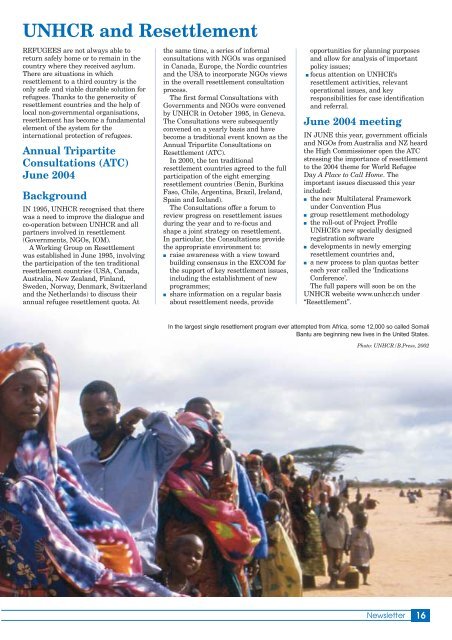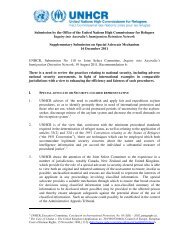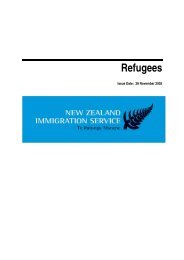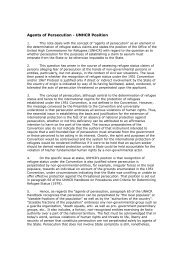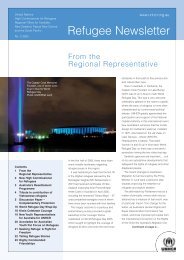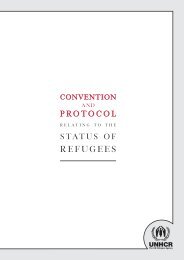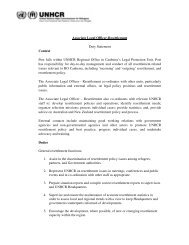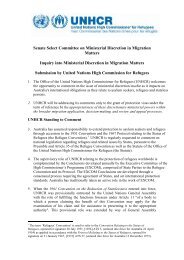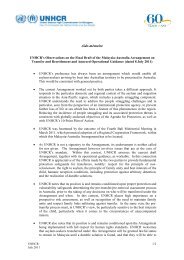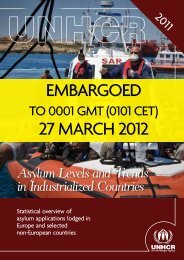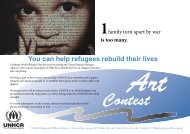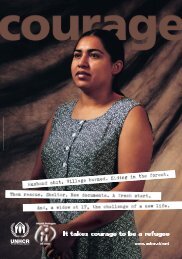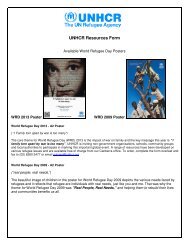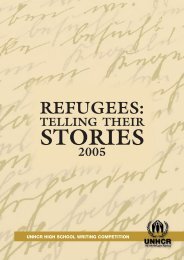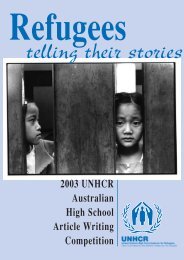download newsletter - unhcr
download newsletter - unhcr
download newsletter - unhcr
You also want an ePaper? Increase the reach of your titles
YUMPU automatically turns print PDFs into web optimized ePapers that Google loves.
UNHCR and Resettlement<br />
REFUGEES are not always able to<br />
return safely home or to remain in the<br />
country where they received asylum.<br />
There are situations in which<br />
resettlement to a third country is the<br />
only safe and viable durable solution for<br />
refugees. Thanks to the generosity of<br />
resettlement countries and the help of<br />
local non-governmental organisations,<br />
resettlement has become a fundamental<br />
element of the system for the<br />
international protection of refugees.<br />
Annual Tripartite<br />
Consultations (ATC)<br />
June 2004<br />
Background<br />
IN 1995, UNHCR recognised that there<br />
was a need to improve the dialogue and<br />
co-operation between UNHCR and all<br />
partners involved in resettlement<br />
(Governments, NGOs, IOM).<br />
A Working Group on Resettlement<br />
was established in June 1995, involving<br />
the participation of the ten traditional<br />
resettlement countries (USA, Canada,<br />
Australia, New Zealand, Finland,<br />
Sweden, Norway, Denmark, Switzerland<br />
and the Netherlands) to discuss their<br />
annual refugee resettlement quota. At<br />
the same time, a series of informal<br />
consultations with NGOs was organised<br />
in Canada, Europe, the Nordic countries<br />
and the USA to incorporate NGOs views<br />
in the overall resettlement consultation<br />
process.<br />
The first formal Consultations with<br />
Governments and NGOs were convened<br />
by UNHCR in October 1995, in Geneva.<br />
The Consultations were subsequently<br />
convened on a yearly basis and have<br />
become a traditional event known as the<br />
Annual Tripartite Consultations on<br />
Resettlement (ATC).<br />
In 2000, the ten traditional<br />
resettlement countries agreed to the full<br />
participation of the eight emerging<br />
resettlement countries (Benin, Burkina<br />
Faso, Chile, Argentina, Brazil, Ireland,<br />
Spain and Iceland).<br />
The Consultations offer a forum to<br />
review progress on resettlement issues<br />
during the year and to re-focus and<br />
shape a joint strategy on resettlement.<br />
In particular, the Consultations provide<br />
the appropriate environment to:<br />
■ raise awareness with a view toward<br />
building consensus in the EXCOM for<br />
the support of key resettlement issues,<br />
including the establishment of new<br />
programmes;<br />
■ share information on a regular basis<br />
about resettlement needs, provide<br />
opportunities for planning purposes<br />
and allow for analysis of important<br />
policy issues;<br />
■ focus attention on UNHCR’s<br />
resettlement activities, relevant<br />
operational issues, and key<br />
responsibilities for case identification<br />
and referral.<br />
June 2004 meeting<br />
IN JUNE this year, government officials<br />
and NGOs from Australia and NZ heard<br />
the High Commissioner open the ATC<br />
stressing the importance of resettlement<br />
to the 2004 theme for World Refugee<br />
Day A Place to Call Home. The<br />
important issues discussed this year<br />
included:<br />
■ the new Multilateral Framework<br />
under Convention Plus<br />
■ group resettlement methodology<br />
■ the roll-out of Project Profile<br />
UNHCR’s new specially designed<br />
registration software<br />
■ developments in newly emerging<br />
■<br />
resettlement countries and,<br />
a new process to plan quotas better<br />
each year called the ‘Indications<br />
Conference’.<br />
The full papers will soon be on the<br />
UNHCR website www.<strong>unhcr</strong>.ch under<br />
“Resettlement”.<br />
In the largest single resettlement program ever attempted from Africa, some 12,000 so called Somali<br />
Bantu are beginning new lives in the United States.<br />
Photo: UNHCR/B.Press, 2002<br />
Newsletter<br />
16


